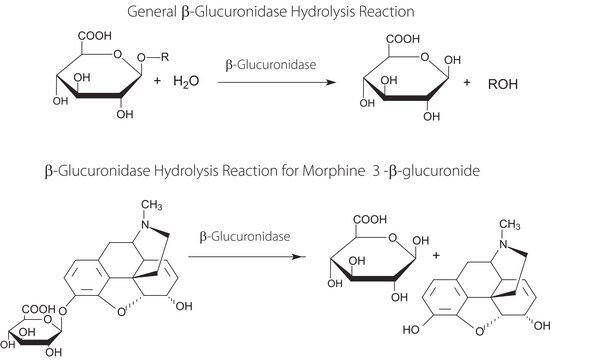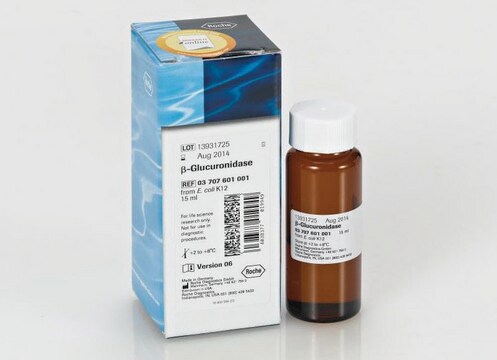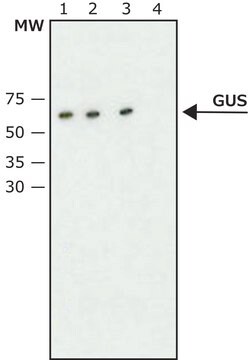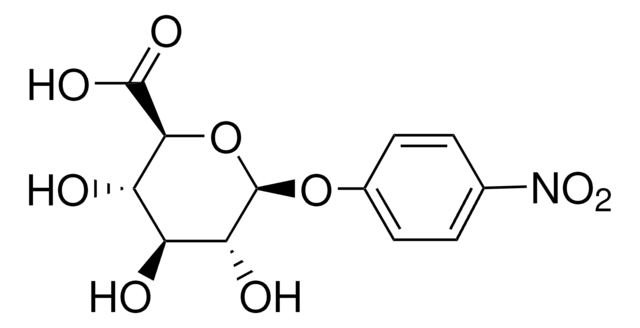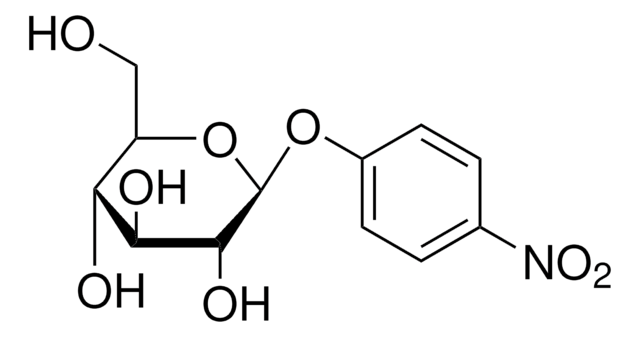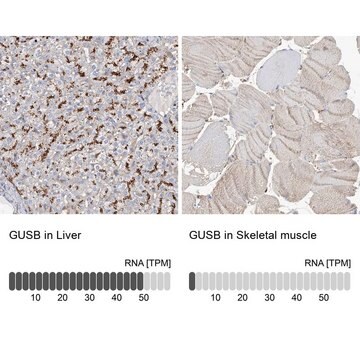G5420
Anti-β-Glucuronidase (N-Terminal) antibody produced in rabbit
~1.5 mg/mL, affinity isolated antibody, buffered aqueous solution
Sinonimo/i:
Anti-GUS
Autenticatiper visualizzare i prezzi riservati alla tua organizzazione & contrattuali
About This Item
Prodotti consigliati
Origine biologica
rabbit
Livello qualitativo
Coniugato
unconjugated
Forma dell’anticorpo
affinity isolated antibody
Tipo di anticorpo
primary antibodies
Clone
polyclonal
Stato
buffered aqueous solution
PM
antigen 60 kDa
Reattività contro le specie
plant
Concentrazione
~1.5 mg/mL
tecniche
western blot: 0.5-1 μg/mL using GUS purified from E. coli
Condizioni di spedizione
dry ice
Temperatura di conservazione
−20°C
modifica post-traduzionali bersaglio
unmodified
Descrizione generale
β-Glucuronidase (GUS) is encoded by the E. coli gus gene (also referred to as uidA), GUS protein (60 kDa) is an hydrolase.
Specificità
Anti-β-Glucuronidase (N-Terminal) recognizes bacterial GUS expressed in transgenic tobacco plants.
Immunogeno
Sythetic peptide corresponding to amino acids located at the N-terminus of E. coli GUS, conjugated to KLH.
Applicazioni
Anti-β-Glucuronidase (N-Terminal) antibody produced in rabbit has been used in western blotting.
Rabbit polyclonal anti-β-Glucuronidase (N-Terminal) antibody may be used for the detection of GUS by immunoblotting (60 kDa). It may be used to detect the reporter GUS marker protein in transgenic plants.
Azioni biochim/fisiol
β-Glucuronidase (GUS) is a screenable markers E. coli GUS has been extensively used to monitor transgene delivery to plant tissue.
β-Glucuronidase catalyzes the cleavage of terminal glucuronic acid bound by β-linkage from mono-, oligo-, or polysaccharides or phenols. GUS is mainly used as a marker during transgenic events. In vitro GUS activity assays predominantly facilitates histochemical and fluorometric localization in tissues. GUS activity is also used for the analysis of expression of foreign genes. GUS reporter genes fused with specific promoter genes have been used for the determination of transformed tissues on culture media containing antibiotics. GUS-specific antibodies are helpful in detecting GUS gene product in transformed plants.
Stato fisico
Solution in 0.01 M phosphate buffered saline, pH 7.4, containing 15 mM sodium azide.
Stoccaggio e stabilità
For continuous use, store at 2-8 °C for up to one month. For extended storage, freeze in working aliquots. Repeated freezing and thawing, or storage in “frostfree” freezers, is not recommended. If slight turbidity occurs upon prolonged storage, clarify the solution by centrifugation before use. Working dilutions should be discarded if not used within 12 hours.
Esclusione di responsabilità
Unless otherwise stated in our catalog or other company documentation accompanying the product(s), our products are intended for research use only and are not to be used for any other purpose, which includes but is not limited to, unauthorized commercial uses, in vitro diagnostic uses, ex vivo or in vivo therapeutic uses or any type of consumption or application to humans or animals.
Non trovi il prodotto giusto?
Prova il nostro Motore di ricerca dei prodotti.
Prodotti correlati
N° Catalogo
Descrizione
Determinazione del prezzo
Codice della classe di stoccaggio
10 - Combustible liquids
Classe di pericolosità dell'acqua (WGK)
WGK 3
Punto d’infiammabilità (°F)
Not applicable
Punto d’infiammabilità (°C)
Not applicable
Scegli una delle versioni più recenti:
Possiedi già questo prodotto?
I documenti relativi ai prodotti acquistati recentemente sono disponibili nell’Archivio dei documenti.
Bacterial glucuronidase as general marker for oncolytic virotherapy or other biological therapies
Hess M, et al.
Journal of Translational Medicine, 9(1), 172-172 (2011)
Michael Hess et al.
Journal of translational medicine, 9, 172-172 (2011-10-13)
Oncolytic viral tumor therapy is an emerging field in the fight against cancer with rising numbers of clinical trials and the first clinically approved product (Adenovirus for the treatment of Head and Neck Cancer in China) in this field. Yet
Release of the recombinant proteins, human serum albumin, ?-glucuronidase, glycoprotein B from human cytomegalovirus, and green fluorescent protein, in root exudates from transgenic tobacco and their effects on microbes and enzymatic activities in soil
Sabharwal N, et al.
Plant Physiology and Biochemistry, 45(6-7), 464-469 (2007)
Vascular-specific expression of GUS and GFP reporter genes in transgenic grapevine (Vitis vinifera L. cv. Albarin
Gago J, et al.
Plant Physiology and Biochemistry, 49(4), 413-419 (2011)
Impact of ubiquitous inhibitors on the GUS gene reporter system: evidence from the model plants Arabidopsis, tobacco and rice and correction methods for quantitative assays of transgenic and endogenous GUS
Fior S, et al.
Plant methods, 5(1), 19-19 (2009)
Il team dei nostri ricercatori vanta grande esperienza in tutte le aree della ricerca quali Life Science, scienza dei materiali, sintesi chimica, cromatografia, discipline analitiche, ecc..
Contatta l'Assistenza Tecnica.